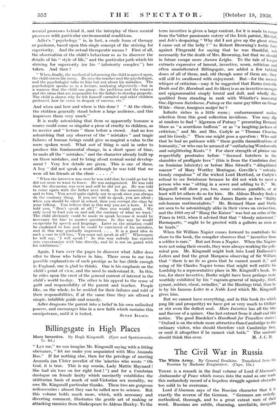Billingsgate in High Places
" LET me," we can imagine Mr. Kingsmill saying with a fitting obeisance, ".let me make you acquainted with Miss Amanda Ros." If for nothing else, then for the privilege of meeting Amanda (an Ulster novelist of the 'nineties who wrote " Oh God, it is true. This is my cousin, Lady Mattie Maynard ! She had six toes on her right foot I ") and for a Cumbrian duologue on female laxity which succinctly establishes the utilitarian basis of much of mid-Victorian sex morality, we owe Mr. Kingsmill particular thanks. These two are gorgeous rediscoveries : almost they can be called new to science. But this volume holds much more, which, with necessary and diverting comment, illustrates the gentle art of making or attacking enemies from Shakespeare to Aldous Huxley. To the term invective is given a' large content, for it is made to range from the bitter passionate outcry of the Irish patriot, Mitchel., and Job's despairing " Why did I not give up the ghost when I came out of the belly ? " to Robert Brovrning's feeble fury against Fitzgerald for saying that he was thankful, not necessarily for the death of Mrs. Browning, but that we should in future escape more Aurora Leighs. To the tale of longer extracts expressive of lament, invective, scorn, criticism and often unadulterated Billingsgate, are added a few tabloid doses of all of them, and, old though some of them are, they will still be swallowed with enjoyment. But—for the merest whisper of criticism—may it be suggested that Burns (outside Death and Dr. Hornbook and its likes) is as an invective-monger and epigrammatist simply brutal and dull, and wholly dis- qualified from standing in rank with Whistler's immortal One Algernon Szoinburne, Putney or the same gay titer on Oscar Wilde—Oscar, bourgeois malgre lui ?
Infinite riches in a little room ; embarrassment makes selection from this good collection invidious. You may dip at random to find " Algernon of Putney " presenting Bernard Shaw as "a scurrilous buffoon" or as "a laughing-jackass of criticism," and Mr. and Mrs. Carlyle as " Thomas Macias and his Goody." Then one might pose a question : Who said that he had no patience with " these gorilla damnifications of humanity," or who can be accused of " outbabying Wordsworth and outglittering Keats " ? For sheer strength of phrase one respectfully prostrates before " licensed butchers in the shambles of profligate love " (this is from the Cumbrian duet on feminine lubricity) or before Miss Sitwell's " dilapidated macaw" of Mary Wortley Montague, Greville's "ostenta- tiously crapulous " of the wicked Lord Hertford, or Carlyle's refusal to see Swinburne because he did not wish to meet a person who was " sitting in a sewer and adding to it." Mr. Kingsmill will show you, too, some curious parallels, or at least will let others do so for him. Mr. Aldous Huxley finds a likeness between Swift and Sir James Barrie as two "flabby sub-human sentimentalists." Mr. Bernard Shaw and Ouida are seen to be astonishingly alike in their views on vivisection, and the 1918 cry of "Hang the Kaiser" was but an echo of the Times in 1815, when it advised that that " bloody miscreant," Buonaparte, " ought to be greeted with a gallows as soon as he lands."
When Sir William Napier comes forward to contribute his share to the book, the compiler observes that " invective from a soldier is rare." But not from a Napier. When the Napiers were not using their swords, they were always working the pole- mical pen. Mr. Kingsmill might look into Lord Dalhousie's Letters and find the great Marquess observing of Sir William that " there is no lie so gross that he cannot assert it," and using of Sir Charles Napier terms that might well entitle his Lordship to a representative place in Mr. Kingmill's book. So too, for sheer invective, Burke might have been perhaps more worthily exhibited by his " captain-general of iniquity, thief, tyrant, robber, cheat, swindler," at the Hastings trial, than he is by his famous Letter to a Noble Lord which Mr. Kingsmill gives him.
But we cannot have everything, and in this book (to which long life and prosperity) we have got so very much to titillate or stir even the dullest soul. More Invective has all the bite and flavour of a quince. One last extract from it shall end this notice. The good Baedeker's Handbook for Travellers states: "Oxford is on the whole more attractive than Cambridge to the ordinary visitor, who should therefore visit Cambridge first, or omit it altogether if he cannot visit both." The sardonic
























































 Previous page
Previous page